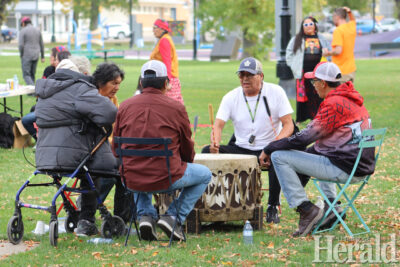Friendship centre director says everyone needs hope
By Al Beeber - Lethbridge Herald on October 5, 2024.
 Herald photo by Al Beeber
Drummers perform during the Sik-Ooh-Kotoki community feast on Friday at Galt Gardens.
Herald photo by Al Beeber
Drummers perform during the Sik-Ooh-Kotoki community feast on Friday at Galt Gardens.LETHBRIDGE HERALDabeeber@lethbridgeherald.com
“Everybody needs hope.”
That’s the message Elaine Creighton Fox wants the public to hear. Everybody needs hope.
Creighton Fox, director of the Sik-Ooh-Kotoki Friendship Centre – the longest standing Indigenous organization in Lethbridge – says Indigenous peoples are still suffering the harm caused previous generations by the residential school system.
As she and Friendship Centre staff handed out styrofoam bowls of berry soup as well as foil-wrapped frybread at Galt Gardens during a Missing and Murdered Indigenous Women and Girls memorial community feast hours before the Sisters in Spirit vigil at the same location, Creighton Fox said all people need to learn to work together in the world.
The Galt event featured drummers, face painting and within an hour of it starting, Friendship Centre staff had already served about 100 people.
Hours later the Sisters in Spirit Vigil and Memorial walk began at City Hall before heading to Galt Gardens.
At the feast, Creighton spoke to the audience about prevention and awareness of harm, especially prevention of sex trafficking among urban youth and reserve youth, both young girls and boys.
“That’s a problem in the city of Lethbridge that nobody really wants to address,” said Creighton Fox.
Both males and females are impacted by sex trafficking as well as members of the vulnerable population, she said.
“It’s a problem all over. To me, the legacy of residential schools is still impacting our people,” said Creighton Fox, noting the focus of prevention needs to be on younger people.
She said it’s important to make kids street smart.
“The young girls walking with their headphones and cellphones and these guys just come along in a van and chloroform them and then throw them in a van,” a situation which also exists in Calgary and Edmonton, she added.
“This is a growing problem and also I want to mention it’s not only Indigenous women and girls” who are missing, Creighton Fox said.
“It’s Indigenous men and boys,” Creighton Fox added, noting one young man is still missing.
Jayden Yellow Feet, 14, has been missing since Aug. 23 and Lethbridge Police Service on Wednesday said they are continuing to ask for help in locating him.
“It’s not gender specific,” said Creighton Fox.
“We need our kids to be street smart,” with them knowing the dos and don’ts on the streets. and the vulnerable population needs to be protected as well, the centre director added.
“It’s a growing problem, something the City and all these organizations, and the Blood and Peigan Tribe, they need to come together and maybe do a task force,” said Creighton Fox.
She said there is much unresolved trauma and grief among Indigenous families with a whole generation of youth who have families left behind.
“We need to have those support systems on and off the reserve to help our people cope and move forward.”
Part of the Indigenous grieving process is ceremony, she said.
Indigenous organizations are trying to bring back traditional food security including a buffalo harvest which will be held Oct. 13 and Indigenous men hunt elk as well to provide meat for their people.
“We’ve been really trying our best at food security but we sure need those supports for our people in the city,’ Creighton Fox said.
Creighton Fox has worked for her people for 43 years in numerous ways and says the roughly 422 tribes across Canada are all having the same social issues.
“We are feeling the impacts of that era (the residential school system), it’s taking huge numbers of our youth.” And younger kids are being seen at shelters, Creighton Fox said.
“What I’d like to see is at some point – this is traditional Blackfoot territory – a safe Blackfoot lodge here for our vulnerable people on the street, some safe housing. You can not only have them overnight and give them that shelter and that safety but have our elders work with them. There’s that window of opportunity. We can get them when they’re very remorseful, sick, sober and sorry. They’re very remorseful and they want to go to detox, they want to go to treatment and if we could kickstart those mechanisms…that would really, really help,” added Creighton Fox who said her people are “genetically hardwired” to respond to the sounds of drumming and the sight of tipis and elders doing face painting.
“Our people stand attention…they respect that and that’s a key to healing our people.”
29-28



I hope we focus on “EVERYONE needs hope.”
I never see it open. Could they offer shelter in cold weather,over night?